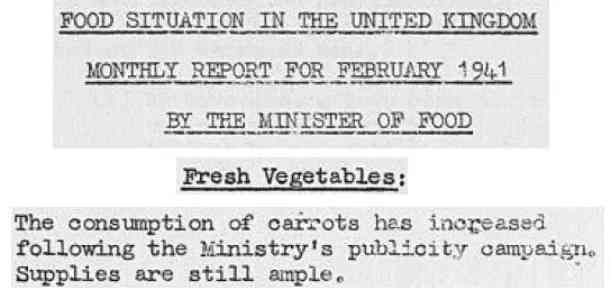Jakarta 20 April 2024
From Garden to Guardian: Carrots in Wartime Strategy
Carrots as a vegetable that has been commonly consumed among the public, suprisingly have played an important role during the time of the second world war. Amid the pressure of war and limited food supplies, the British government found creative ways to maintain the stability of their country's national security by promoting carrot consumption, an effort to safeguard public health and support their national strength. The campaign aimed to compensate for the shortage of other food sources implications of the blockade food restrictions at sea by Germany.
The German blockade was a strategic move designed to cut off essential supplies to Britain, aiming to weaken the nation by severing its supply lines. By targeting maritime routes, Germany intended to isolate Britain and create a scarcity of vital resources, including food. This tactic was part of the broader Battle of the Atlantic, where German U-boats and naval forces sought to dominate the sea lanes and prevent the Allies from receiving supplies from across the world. As detailed by H.P. Willmott in "The Great Crusade: A New Complete History of the Second World War," the blockade significantly strained Britain's food supply, necessitating innovative solutions to ensure the population remained nourished and morale stayed high .
In response to the blockade, the British government launched several initiatives to promote self-sufficiency and resourcefulness among its citizens. One notable effort was the "Dig for Victory" campaign, which encouraged people to grow their own vegetables, including carrots, in gardens and allotments. By promoting the consumption of carrots, the government aimed to address both the nutritional needs of the public and the oversupply of this particular crop. The clever use of propaganda, such as claiming that carrots could improve night vision, further embedded the vegetable into the wartime narrative, linking it directly to national security efforts. Thus, the humble carrot became a symbol of resilience and ingenuity in the face of adversity .
The Role of Carrots in Wartime Britain
By the autumn of 1940, as the war in Great Britain had subsided, the German Luftwafe had begun a new phase of war, a blitzkrieg that caused parts of England, especially London, to impose city-wide blackouts. With the aim of hiding the advanced technology of the RAF (Royal Air Force) which is a secret that blocks Luftwafe attacks from nowhere.
In her book Dig for Victory: The Story of Wartime Gardening in Britain, Kate Murphy details how the British government launched the "Dig for Victory" campaign to address these food shortages. The campaign encouraged citizens to cultivate their own vegetables, including carrots, in home gardens, public parks, and vacant lots. This widespread effort helped to reduce the nation's dependence on imported food, bolster public health, and boost morale during the war.
Securitizing Carrots: Applying Barry Buzan's Theory in Wartime Britain
This phenomenon eventually made the British government at that time to say "carrots can improve eye health to aid night vision and RAF night flight success" in their newspapers. Instead of the truth that is, carrying out securitization actions by promoting the consumption of carrots.
This shows that the British Government successfully applied the concept of securitization as explained by Barry Buzan. At that time, the British government, especially the food minister had become a secure actor by carrying out rhetorical actions or known as speech acts, related to carrots. They effectively used carrots as a symbol to convey a message of safety to the public, although there was actually no direct link between carrot consumption and the radar technology actually used by the RAF at the time.

A Political Strategy Disguised as Health Promotion
This practice is not just a Health promotion effort, it is also a careful political strategy. The government uses rhetoric to turn issues that are not really security threats into issues that are considered threats, with the aim of mobilizing public support to maintain national security stability. In addition, the consumption of carrots was also aimed at dealing with the oversupply of carrots at the time and the shortage of other food sources due to the naval blockade by Germany, this shows that the use of carrots in this context is not only symbolic, but also a practical response to the emergency situation facing the country. Thus, this practice is an example of how the concept of securitization can be used in real situations to achieve broader goals, both political and economic practice.
As highlighted in Kate Murphy's book, "Dig for Victory: The Story of Wartime Gardening in Britain", the British government also launched campaigns to encourage citizens to grow their own food, including carrots, during the war. This initiative was part of a broader strategy to ensure food security and self-sufficiency in response to the challenges posed by the war. The "Dig for Victory" campaign not only promoted the practical benefits of home gardening but also reinforced the idea of communal effort and resilience, further integrating the consumption and cultivation of carrots into the national narrative of survival and solidarity during the war.
Baca konten-konten menarik Kompasiana langsung dari smartphone kamu. Follow channel WhatsApp Kompasiana sekarang di sini: https://whatsapp.com/channel/0029VaYjYaL4Spk7WflFYJ2H








